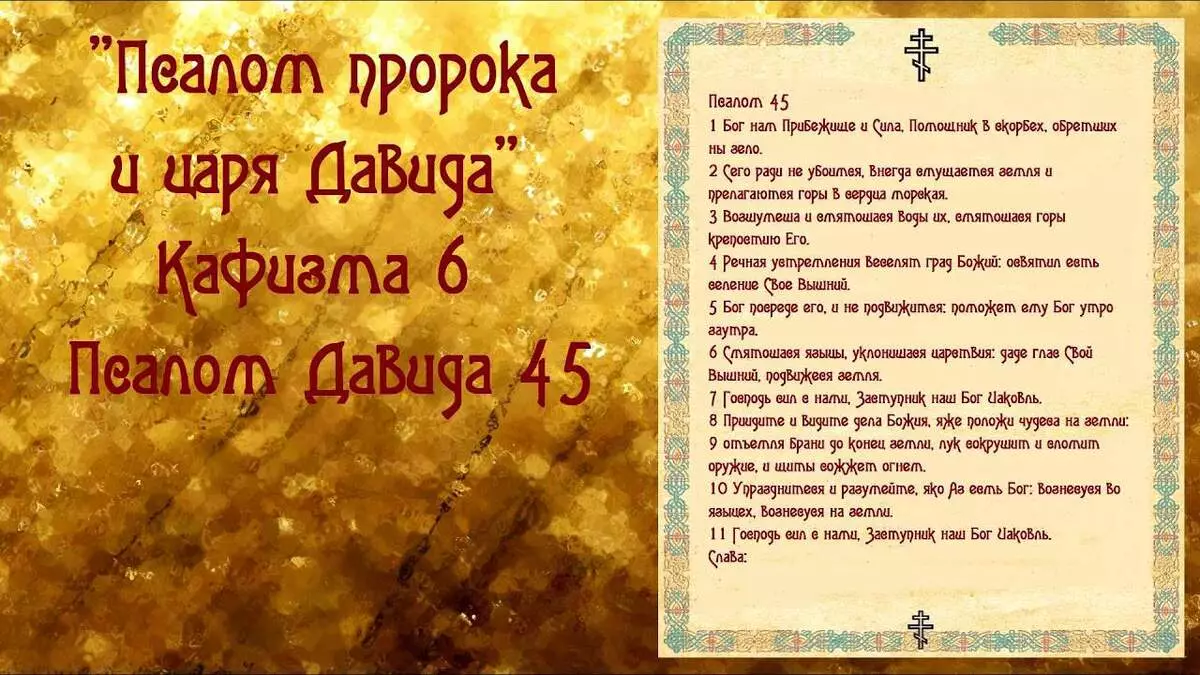I have long been studying the psalms and their interpretations. It helps to correctly understand the text and be closer to the Lord. Today I will tell the value of Psalm 45, I will describe in detail the reading rules.
Structure
Psalm is one of the forms of Christian lyrical poetry. He is read in worship services in temples and independently at home. As a rule, in Psalms, as well as in prayers, praise to the Lord or Molba about help.

Find out what awaits you today - a horoscope for today for all zodiac signs
Each psalm consists of poems, the same, in turn, are still divided into semi-wilds (there may be two or more of them). It is noteworthy that this division may be varied depending on the editorial office of the Psaltier. The form of writing psalms is based on the syntactic parallelism (monotonous constructions of proposals, when all their main members go in one sequence) and the metric organization (when the strings are proportioned in time and there is an alternation of long and short syllables).
Studying Psalms, it can be noted that some of them contain across. This is when the initial letters of the strings form any word or phrase. All Psalms are designed for the general rules of Jewish poetry.
The content of texts of different psalms is somewhat different by genre varieties. There are psalms of the glorification of God, complaints, historical reviews, reflections and even curses. The one in all psalms is that they sound the appeal to the Lord.
Often, Psalms have inscriptions that are of particular difficulty in determining their value. Here, as a rule, the author and event preceding the writing of this text is indicated. Sometimes there are instructions in the inscriptions.
By numerous requests of readers, we have prepared an application "Orthodox calendar" for a smartphone. Every morning you will receive information about the current day: Holidays, posts, commemoration days, prayers, parables.
Download free: Orthodox calendar 2020 (Available on Android)
Separate words, both in the psalms themselves and in the inscriptions, do not have an exact value, therefore there are different translations. For example, the word "MIS" does not have exact value. According to one version, it has a common root with the word "trembling", and on the other is the designation of those psalms that are intended for the services and the Jerusalem temple. This word is an inscription to a third of all available psalms. Or take the word "Shigayon" with an incomprehensible meaning, presumably denotes the type of melody or some kind of musical instrument, and possibly translates like a "deplorable song".
Psalms in Orthodoxy
There is a certain consolidation of psalms for the divine services of the daily circle - they are reading every day. For example, for evening - 140, 141, 129, 116, 33 (this is generally mandatory). In the morning they read 3, 37, 62, 87, 102, 142 and be sure to 50. In the surrounding worship, it always sounds the 118th, it is very big, and only he is read only on the eve of the parent Saturday.

Sometimes it reads the Psalm himself, in certain cases, they alternate with chants written by church authors.
There is an oldest tradition in monastic, according to which the Psaltry should be read in full within a week. For convenience, the book is divided into 20 pieces (cafia). Each of them has its own division into three parts. There may be a different number of psalms in the caphysism - from 6 to 9. As a rule, two caffes are read in the morning, in the evening - one. In some cases, three caffes are read in the morning. During the Great Post, the Psaltry is read twice a week. Not every temple complies with such a strict charter, but in the monasteries it is necessary.
Psaltry has the same conditional separation. These are almost five different books, each ends with a song, praising gentlemen.
- Contains psalms 1-40. This is the book of David, because all these psalms, with a rare exception, are written;
- Psalms 41-71. At the beginning, there are texts under the authorship of the sons of Koreev, then the authors change, and this is already Asaf, Solomon, Peru David belongs to 18 psalms here, and three - unknown psalmills;
- 72-88 - called Assaph's book, despite the fact that in addition to his texts there are still works of other authors;
- 79-105 Psalms. It begins with two Moses Psalms, hereinafter - two from David and 14 pieces belonging to the unknown. Because of this, this part received its name - "The book of unknown singers";
- 106-150 - It is called "Book of Festive Songs", as there are mainly a laudatory text. The authors are David (15 psalms), Solomon (1) and unknown Psalmills (28).
In ancient Russia, the Psalrtyry was taught by literacy, it was the third book, designed for this, after the station and chatendil. Psaltry and his psalms accompanied people in Russia from infancy and until death. He was taken to always have at hand, especially in times of trouble, grief, joy, traveling.
Themes of Psalmov
There is a classification of psalms according to the type of human impact:- This includes psalms for the person's personnel, spanking and different human fears.
- Psalms for personal ailments and damage. These psalms are suitable in cases where the negative has already begun its integral effect on the human body.
- The show of spiritual actions, bad thoughts, the expression of repentance. Without repentance there will be no benefit from reading.
- Reading for children up to 12 years old, as well as a certificate of intra-day relationship. This group includes very strong psalms, we can say that they have a universal cleansing force.
- Spiritual ailments and damage.
- Karmic problems, hard life. Reading the psalms of this group removes negative life attitudes, and also clears from serious ailments that are able to shorten life.
- The most commonly used group of psalms, which is reported from negative impact.
- Protecting a person, refining it and cleansing.
- Rarely used, specific psalms, carrying a strategy of the struggle, threatening for life, a choice of life journey.
- Puish songs.
Psalm 45.
The fact that a certain prayer can help in some particular situation, has been noticed for a long time. Psalms are no exception, and each of them has its purpose. For example, Psalm 45 reads in the following cases:
- To praise the glory of the Lord. The text expresses hope for the mercy and support of the forces of heaven, faith for his help in the troubles, hope for higher patronage.
- In order to pray to God for marriage, if there are some obstacles that are revealed by both people from envy and demons. God is a delightful of everyone who bothers Heaven. There is no such force that could withstand the truly believer Christian - God is always on his defense.
- When there is a need to protect against thieves and robbers.
- When ill-wishers are slander and erected in vain.
Read 45 Psalm once a day, should not be allowed at the same time. It is better to read it once calmly than 10 times skid.

History of writing
As many know from history, the Jewish people were quite small, and so it happened that he was forced to constantly reflect some attacks of his enemies. Their capital was located in such a way that the attacks could be expected on any side. In addition, many militant tribes lived in the district.In this Psalm, it is described as one of the enemy offensive, from which Jews were lucky to exit the winners. Of course, the victory was attributed to God. After all, only he was able to become a defender of the sacred city, sterling the ships of the enemies.
According to some data, Psalm 45 was written during the Board of Jehosafat.
There are many translations of the 45th, only in Russian there are several pieces. Everyone will choose for himself the one that will appeal. After all, it is no secret that the psalms can be read and at home is also very useful, although it does not feel any comparison with readings in worship in the temples.
Interpretation
The author of the 45th Psalm is one of the Korea sons. It should be performed by a voice voice - maiden. The meaning of the text lies in the fact that in any situations a person has only one defense - the Most High. Nothing can enjoy a person who is unconditionally relieved on him - no natural disasters or war.
The text is very often used hyperboles - stylistic figures of intentional exaggeration, which increase the expressiveness of the thoughts expressed. Examples of such exaggerations:
- "Water and Mountains", referred to in the text, most likely denote the peoples who go to war. These are enemies that threaten from all sides. Another embodiment of the interpretation of this phrase is sins, to the edges of the human soul. Then we are talking about the fact that everyone who believes in God is not scary, it will save from all misfortunes and troubles.
- "River flows are cheerful" - in this phrase is meant the Most High, it is a source that feeds the Earth and the people. Everyone who drinks from his source is given victory.
- "God in the midst of him ..." - this means that it will very soon emerge the help asking.
- "The peoples were hurt ..." - this can only be one explanation - no matter how strong and terrible enemy, the Lord is always able to destroy evil intentions. Becoming on this path, the enemy will lead himself to death.
- "Starting Brass ..." - freeing the peoples, the Almighty gives them peace and peace, and all the enemies will be cranched on the very edge of the earth.
- "Stop and know ..." - after the victory over the enemy, the Lord pointed him his wonderful strength, which will always be on the side of the one who believes in the true God. That is: Know who your Lord.
Conclusion
- Psalms are a form of lyrical poetry.
- The psaltry itself and psalms separately have their own structure.
- Psalm 45 - long, you can read it passages.
